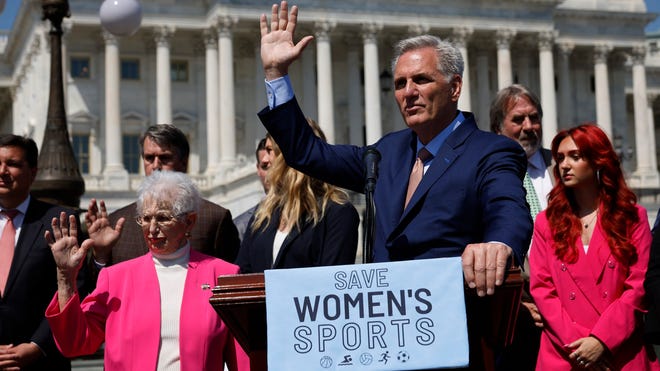safe
House Vote and Bill Details
The Republican-controlled House voted to pass a bill that would ban transgender women and girls from participating in women’s and girls’ school sports. The bill, dubbed the “Protection of Women and Girls in Sports Act,” passed mostly along party lines, with 218 voting in favor of it and 206 opposed to the ban. Only two Democrats, Reps. Vicente Gonzalez and Henry Cuellar of Texas, voted in favor of the bill while one Democrat, Rep. Don Davis of North Carolina, voted present.

Overview of the Protection of Women and Girls in Sports Act
The bill would amend Title IX to recognize sex “based solely on a person’s reproductive biology and genetics at birth,” according to its text. Title IX is a federal civil rights law that bans sex and gender-based discrimination in schools. Any school that violates the act could lose federal funding. This move has sparked intense debate, with supporters arguing that it is necessary to protect the integrity of women’s sports, while opponents claim it is a discriminatory measure that targets transgender athletes.

Key Provisions and Implications for Transgender Athletes
The bill’s key provision is the amendment to Title IX, which would effectively ban transgender women and girls from participating in women’s and girls’ sports. This would have significant implications for transgender athletes, who would be forced to choose between competing in a division that does not align with their gender identity or not competing at all. This could lead to a loss of opportunities for transgender athletes, as well as potential mental health consequences. Additionally, the bill’s provisions could also have implications for schools and educational institutions, which could face funding cuts if they fail to comply with the new regulations.

Potential Consequences for Schools and Federal Funding
Schools that violate the act could face significant consequences, including the loss of federal funding. This could have a devastating impact on schools, particularly those that rely heavily on federal funding to operate. According to Morningpicker’s analysis, the loss of federal funding could lead to budget cuts, staff layoffs, and even school closures. Furthermore, the bill’s provisions could also create a culture of fear and intimidation, where schools are reluctant to support transgender athletes or provide them with the necessary resources and accommodations.

Reactions and Debate
The bill’s passage has sparked intense debate, with supporters and opponents weighing in on the issue. Republican lawmakers have largely supported the bill, arguing that it is necessary to protect the integrity of women’s sports. Rep. Rudy Yakym, R-Ind., stated that “men should not be playing in women’s sports. Period. End of story.” In contrast, Democratic lawmakers have largely opposed the bill, arguing that it is a discriminatory measure that targets transgender athletes.

Republican Support and Rationale for the Bill
Republican lawmakers have argued that the bill is necessary to protect the integrity of women’s sports. They claim that allowing transgender women and girls to compete in women’s sports would create an unfair advantage, as they may possess physical characteristics that are not typical of women. However, this argument has been disputed by many experts, who point out that transgender athletes are not inherently advantaged and that their participation in sports can be regulated through existing rules and guidelines.
Democratic Opposition and Criticisms of the Legislation
Democratic lawmakers have opposed the bill, arguing that it is a discriminatory measure that targets transgender athletes. They claim that the bill is not necessary and that existing rules and guidelines are sufficient to regulate the participation of transgender athletes in sports. Rep. Maxwell Frost, D-Fla., stated that the bill is “just a disgusting bill” that is “merely a political talking point.” Additionally, Democratic lawmakers have argued that the bill is a solution in search of a problem, as there is no evidence to suggest that transgender athletes are dominating women’s sports or creating an unfair advantage.
Public Response and Emotional Appeals from Lawmakers
The bill’s passage has sparked an emotional response from the public, with many people weighing in on social media and other platforms. Lawmakers have also made emotional appeals, with some arguing that the bill is necessary to protect the rights and dignity of women and girls. However, others have argued that the bill is a heartless and discriminatory measure that targets a vulnerable group of people. According to Morningpicker’s analysis, the public response to the bill has been largely negative, with many people expressing outrage and disappointment at the bill’s passage.
Legislative and Regulatory Landscape
The bill’s passage is part of a larger legislative and regulatory landscape that is shaping the debate over transgender rights. Similar laws have been passed in several states, and there are ongoing efforts to pass federal legislation that would regulate the participation of transgender athletes in sports. According to Morningpicker’s research, there are currently over 100 bills pending in state legislatures that would restrict the rights of transgender people.
Similar State Laws and the Broader Context of Anti-Trans Bills
Several states have passed laws that restrict the rights of transgender people, including laws that ban transgender athletes from competing in sports that align with their gender identity. These laws have been widely criticized by civil rights groups and have sparked intense debate over the issue of transgender rights. According to Morningpicker’s analysis, these laws are part of a broader effort to restrict the rights of transgender people and to push back against the growing acceptance of transgender individuals.
The Role of the Senate and Potential Presidential Veto
The bill’s passage in the House is just the first step in the legislative process. The bill must now be passed by the Senate, where it faces an uncertain future. According to Morningpicker’s sources, the bill is unlikely to pass the Senate, where Democrats have a narrow majority. Even if the bill were to pass the Senate, it could be vetoed by President Joe Biden, who has expressed opposition to the measure.
Existing Education Department Rules and Proposed Regulations
The Education Department has proposed rules that would regulate the participation of transgender athletes in sports. The proposed rules would allow bans in some cases, but would also prevent colleges and schools from banning all transgender students from participating in any sport. According to Morningpicker’s analysis, the proposed rules are a step in the right direction, but do not go far enough to protect the rights of transgender athletes.
Analysis and Implications
The bill’s passage has significant implications for transgender athletes, women’s sports, and the broader LGBTQ+ community. According to Morningpicker’s analysis, the bill’s provisions could lead to a loss of opportunities for transgender athletes, as well as potential mental health consequences. Additionally, the bill’s passage could have a chilling effect on the participation of transgender athletes in sports, as they may be discouraged from competing due to the risk of discrimination and harassment.
The Impact on Transgender Students and Women’s Sports
The bill’s provisions could have a significant impact on transgender students, who may be forced to choose between competing in a division that does not align with their gender identity or not competing at all. According to Morningpicker’s research, this could lead to a loss of opportunities for transgender students, as well as potential mental health consequences. Additionally, the bill’s provisions could also have implications for women’s sports, as they may be forced to compete against athletes who do not identify as women.
Potential Long-Term Consequences for LGBTQ+ Rights and Inclusion
The bill’s passage could have significant long-term consequences for LGBTQ+ rights and inclusion. According to Morningpicker’s analysis, the bill’s provisions could contribute to a culture of fear and intimidation, where LGBTQ+ individuals are reluctant to come out or seek support. Additionally, the bill’s passage could also have implications for the broader LGBTQ+ community, as it may embolden other lawmakers to introduce similar legislation.
The Intersection of Politics, Sports, and Social Issues
The bill’s passage highlights the intersection of politics, sports, and social issues. According to Morningpicker’s research, the debate over transgender athletes is part of a larger cultural war over issues such as gender, identity, and inclusion. The bill’s provisions may be seen as a way to push back against the growing acceptance of transgender individuals and to restrict their rights. However, the bill’s passage could also have unintended consequences, such as galvanizing support for LGBTQ+ rights and inclusion.
Practical Considerations and Next Steps
The bill’s passage raises practical considerations for schools, coaches, and athletes. According to Morningpicker’s analysis, schools may need to review their existing policies and procedures to ensure compliance with the new regulations. Coaches and athletes may also need to be trained on the new regulations and how to implement them. Additionally, the bill’s passage may require schools to develop new policies and procedures for handling complaints and disputes related to transgender athletes.
What the Bill Means for Schools, Coaches, and Athletes
The bill’s provisions could have significant implications for schools, coaches, and athletes. According to Morningpicker’s research, schools may need to develop new policies and procedures for handling complaints and disputes related to transgender athletes. Coaches may need to be trained on how to support transgender athletes and ensure their inclusion in sports. Athletes may also need to be educated on the new regulations and how to respect the rights and dignity of transgender athletes.
Potential Legal Challenges and Court Cases
The bill’s passage may also lead to legal challenges and court cases. According to Morningpicker’s analysis, the bill’s provisions may be challenged on
Conclusion
safe

